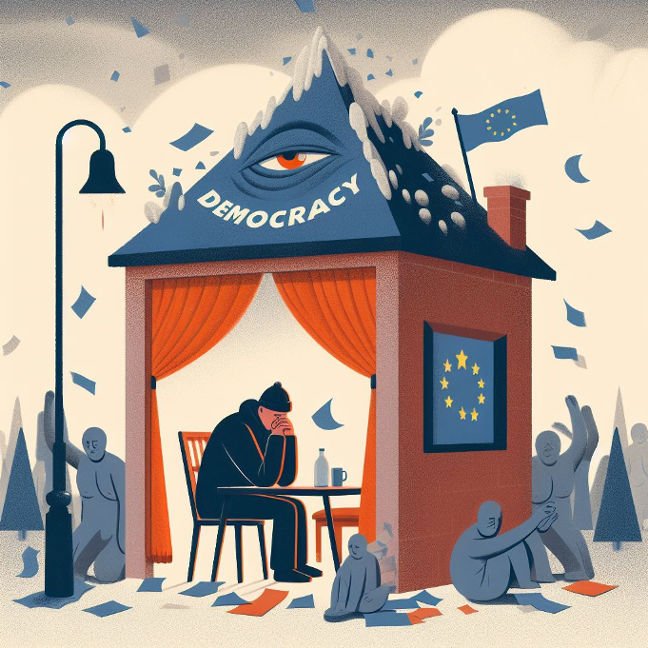A growing number of German youth report feeling lonely regularly. This causes substantial health hazards, but experts believe there is a correlation between loneliness and anti-democratic beliefs. Now the question is Is loneliness a threat to democracy
Loneliness is frequently regarded as a quiet pandemic in Germany. According to the most recent Federal Statistical Office data, one in every six adults over the age of ten experiences loneliness regularly, accounting for over 12.2 million individuals.
Psychologists define loneliness as the perceived difference between wanted and real social relationships, as opposed to social isolation. According to statistics, young people in Germany are most negatively impacted: A quarter of young individuals between the ages of 18 and 29 report they frequently feel lonely.
Loneliness, according to Green Party Family Minister Lisa Paus, is one of the most urgent challenges of our time, not only because it increases the risk of heart disease, strokes, dementia, and depression, but also because it impairs social cohesiveness.
According to the study “Extrem Einsam” (“Extremely Lonely”), which was conducted as part of the Kollekt project funded by the Federal Family Affairs Ministry, loneliness may also pose a threat to democracy. Researchers discovered a link between loneliness and anti-democratic beliefs, including a proclivity for populism, belief in conspiracy theories, authoritarian tendencies, and support for political rule-breaking and violence.
“These aren’t causal connections, but there is a correlation,” says Claudia Neu, a sociologist and one of the study’s authors. People who have been lonely for a long time have a negative perception of the world, seeing it as darker and more menacing – they trust fewer people, as well as their environment and democratic institutions.
That is an issue, according to Neu, because democracy feeds on involvement, and support for democracy is linked to how strongly a person feels connected to society as a whole.
Loneliness is only one risk factor Among Many
Gabriela Grobarcikova, 25, says she first felt lonely when she was 15. “I felt distanced from other people, a feeling that there were a lot of people around me, but the sense of a real connection was missing,” she told Newsweek.
Grobarcikova stated that she did not have a stable home life and found it difficult to sustain long-term friendships, but she found a feeling of connection in politics. Her parents’ center-left beliefs, she believes, helped her avoid developing anti-democratic or radical views.
“Loneliness is characterized by a strong, unfulfilled longing for community, which I discovered through political engagement and activity. Fortunately, I discovered it in local community-based, social-democratic political circles,” said Grobarcikova, who now works for a nonprofit that promotes democratic engagement in schools.
According to Kollekt’s research, young people are increasingly skeptical about democracy. Of the 1,008 young people aged 16 to 23, less than half (48%) believed that the democratic system in Germany works well, and even fewer (40%) believed that politicians are prepared to face future issues.
According to Björn Milbradt, a sociologist and expert on radicalization among young people at the German Youth Institute, there is no scientific evidence to show that young people today hold more politically extreme views than preceding generations did.
“It appears that young people are growing increasingly radicalized these days. However, I would advise being cautious. Radical or extremist youth groups, or young people’s movements, have always existed, Milbradt told DW, citing the 1968 West German student movement and the surge of right-wing extremist violence that followed German reunification in the early 1990s.
Milbradt explained that research has shown that a young person’s likelihood of becoming radicalized is influenced by a variety of factors other than loneliness. Socioeconomic status, an insecure home situation, inadequate critical thinking abilities, and exposure to misanthropic beliefs can all play a role.
“There is more than one factor. I believe it is critical to underline this because there is a tendency in the public debate to approach radicalism in a very one-dimensional manner, with TikTok being one of the primary factors radicalizing young people,” he stated.
“But what you always have to say is that people are particularly radicalized by [content on] TikTok if they already have a receptiveness to certain ideologies or derogatory attitudes.”
Increased youth agency in politics
Milbradt emphasized the importance of being watchful about extremism among young people, citing the 2019 Shell Youth Study, which revealed that roughly one-third of young people have a propensity toward right-wing populism in their attitudes.
“That was a very alarming result and I think it still is,” he continued. “In certain election outcomes, a sizable portion of young voters support the [far-right] Alternative for Germany (AfD). In this regard, we are constantly receiving warning signals.
The authors of the Kollekt report also stated that politicians and civil society organizations should make political education more accessible to all and provide more possibilities for young people to participate in the democratic process.
“I believe you can make society as a whole aware of what it means to tell a generation that will soon hold positions of power that they don’t matter.
FAQs
How does a lonely person behave?
Loneliness can manifest itself in various ways, and it’s important to remember that alone time isn’t always a bad thing. Some people simply enjoy solitude and recharge their batteries by being on their own.
Here are some signs that someone might be lonely:
- Social Withdrawal: They may prefer to spend a lot of time alone and avoid social situations. This could include eating lunch alone at work, declining invitations to go out, or seeming disinterested in conversations.
- Difficulty Connecting: Lonely people might struggle to form new relationships or feel a lack of depth in their existing ones. They may come across as shy or awkward in social settings.
- Craving Connection: Despite withdrawing, someone who is lonely might crave a social connection.
- Negative Self-Perception: Loneliness can lead to negative thoughts about oneself. They might express feelings of worthlessness or social anxiety.
It’s important to note that these are just some signs, and not everyone who exhibits them will be lonely. If you’re concerned about someone, the best approach is to reach out and offer support.
How do you know if you’re lonely?
Loneliness can be tricky to recognize because it doesn’t always mean being completely alone. Here are some signs to look out for:
- Emotional cues: Do you often feel a sense of emptiness, sadness, or longing for connection? Loneliness can manifest as a deep ache or a hollowness.
- Social disconnection: Do you find yourself withdrawing from social activities or conversations, even if you want to connect?
- Behavioral changes: Have you noticed changes in your desire to spend time with others? Maybe you’ve become more irritable or have a hard time concentrating.
- Coping mechanisms: Are you using unhealthy habits to manage your loneliness, like excessive screen time, overeating, or shopping?
If you find several of these signs resonate with you, it could be a sign of loneliness. Remember, it’s perfectly normal to feel lonely sometimes. But if it’s persistent, there are steps you can take to feel more connected.
How do you know if you’re lonely?
Recognizing loneliness in yourself can be tough because it can be subtle and sometimes hidden by social situations. Here are some ways to check in with yourself:
- Emotional:
- Do you crave deeper connections? Even if you have friends or family around, do you yearn for more meaningful conversations or someone who truly “gets” you?
- Do you often feel sad, empty, or a longing for something missing? Loneliness can feel like a deep ache or a hollowness that social interaction doesn’t quite fill.
- Social:
- Do you find yourself withdrawing from social activities or conversations, even if you want to connect? Maybe you used to enjoy going out but now prefer staying home alone.
- Do you feel like you’re on the outside looking in when you’re around others? Even at parties or gatherings, do you feel isolated or disconnected?
- Behavioral:
- Have you noticed a change in your desire to spend time with others? Maybe you’ve become more irritable or withdrawn.
- Are you using unhealthy habits to cope with your feelings? This could be things like excessive screen time, overeating, or impulsive shopping.
Remember, alone time isn’t necessarily bad. Introverts, for example, often need solitude to recharge. But if these signs keep popping up and you’re feeling down, it might be loneliness.

I’m a seasoned content creator with 6+ years of experience crafting engaging, SEO-optimized content that drives traffic and rankings. I excel in keyword research, link building, and guest posting, ensuring your brand reaches new heights.

